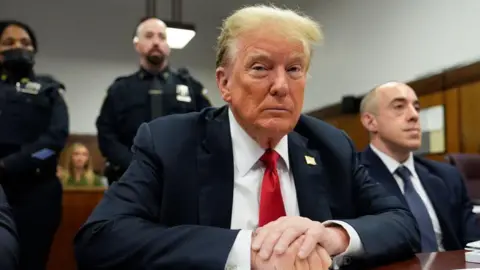Prosecutors back delaying Trump sentence until he leaves White House
 Getty Images
Getty ImagesNew York prosecutors have vowed to oppose President-elect Donald Trump’s effort to overturn his criminal conviction, but they expressed a willingness to wait to sentence him until he completes his upcoming presidential term.
Prosecutors urged the judge who is overseeing Trump's sentence after his guilty verdict to consider options other than dismissal, including holding off until the president-elect is scheduled to leave the White House in 2029.
The Manhattan district attorney's office asked Justice Juan Merchan to set a new deadline of 9 December for both sides to consider the case and file new motions.
Trump's sentencing is scheduled for 26 November, but it could be delayed further.
In May, Trump was convicted on 34 charges of falsifying business records, stemming from an attempt to cover up a potential sex scandal ahead of his first presidential victory in 2016.
A few weeks later, however, the US Supreme Court held in a separate case that presidents enjoy a degree of immunity from criminal prosecution for "official acts."
Trump's lawyers want a judge to overturn his New York conviction on the grounds of presidential immunity, and because of his impending term in the White House.
On Wednesday, attorney Todd Blanche called for the "immediate dismissal of this case," and argued such an outcome was required by the US Constitution and the Presidential Transition Act. Mr Blanche asked for a deadline of 20 December to file a full brief with the court.
Prosecutors believe the issues at the centre of their case do not have to do with official presidential duties.
They stressed that the trial and conviction occurred before the US Supreme Court decided this summer that presidents had broad protection from criminal prosecution.
They did acknowledge Justice Merchan's "need to balance competition consititutional interests", however.
They asked the judge to consider "non-dismissal options" that could included "deferral of all remaining criminal proceedings until after the end of Defendant's upcoming presidential term".
“The DA is saying that the court should put off sentencing until after Trump leaves the White House," said New York attorney and former prosecutor Mitchell Epner. "Don’t drop the conviction - but don’t do anything until after Trump leaves office."
With Trump's inauguration just weeks away, little time remained on the calendar for a new round of motions and briefs, Mr Epner said. The case would be paused anyway after 20 January, when Trump takes the oath of office, he said.
Of the four criminal prosecutions against Trump, the New York case was the only one to go to trial and reach a guilty verdict.
But the final outcome is now uncertain as Trump prepares to head to the White House next January.
Nevertheless, Trump's spokesman Steven Cheung - who has been tapped to serve as White House director of communications - declared "total and definitive victory".
Justice Merchan has yet to rule on the matter, however.
Former Manhattan prosecutor Diana Florence said that this request makes it doubtful that Trump would face sentencing at the scheduled hearing on 26 November, as the judge will probably accept the prosecutors' proposal.
"I think there's less than half a percent chance that he'd be sentenced next week," she said.
The judge has a range of options for Trump's sentence, including fines, probation and a four-year prison sentence - though legal experts say the president-elect could avoid any legal punishment.
The Manhattan District Attorney Alvin Bragg first charged Trump with falsifying business records in April 2023, accusing the president-elect of a hush-money scheme in the waning days of the 2016 presidential campaign.
Prosecutors said that Trump tried to disguise reimbursements to his personal attorney, who had paid off an adult film star with whom Trump allegedly had an affair. Because of the scheme's proximity to the election, they claimed it amounted to election interference.
Trump maintained his innocence, denied that the affair ever occurred and alleged the case was a form of political persecution.
But in May, a jury of 12 New Yorkers found the president-elect guilty.
Trump's sentencing hearing was delayed multiple times. The court agreed to hold off any decisions until today while all parties sorted out the historic implications of his re-election.
Madeline Halpert contributed to this report.
